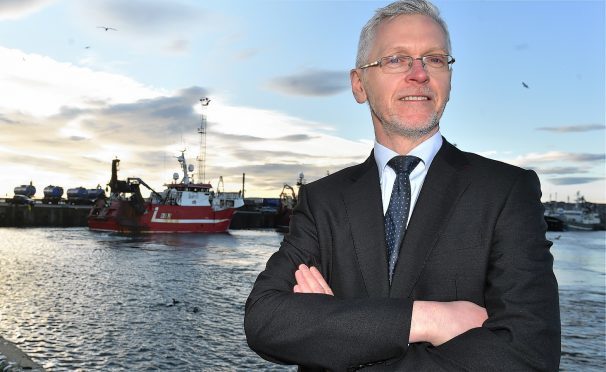Peterhead Port Authority (PPA) bosses are toasting a record-breaking year, with success achieved on many fronts.
Peterhead Port Authority (PPA) bosses are toasting a record-breaking year, with success achieved on many fronts.
The Buchan harbour – Europe’s busiest for white-fish – held its largest markets to date.
Around 8,000 boxes of North Sea catch passed through the facility on more than one day.
The market also notched up the biggest weekly volume in its history, with more than 35,000 boxes traded.
With 2016 still not over, landings are up by more than 18% on last year’s total and predicted to be worth more than £180million.
PPA chief executive Ian Laidlaw said: “Pelagic (mainly mackerel and herring) landings have also recovered after a difficult period following the fire at Northbay Pelagic in January 2015.
“Both main pelagic species are up, compared to 2015, with mackerel nearly 19,000tonnes higher at 57,000tonnes and herring up almost 10,000tonnes to 42,000tonnes.
“With quotas set to be increased again and the start of works on the £50million redevelopment of the inner harbours and the construction of a new fish market, Peterhead is well-placed to continue our plans for growth.”
The investment will allow PPA to expand the market by 50%, creating capacity for more than 9,000 boxes, and bring together key services and facilities so fleets can complete port calls quicker.
Mr Laidlaw said Brexit offered the potential for “improved economic times” for the port and wider industry.
But he warned: “Until the exit negotiations have been concluded these opportunities cannot be guaranteed.
“Fishing industry leaders are well aware of the opportunities and risk of Brexit they have mobilised.
“However, gaining additional access and quota is only the first step in the long road to full recovery.
“In order to fully capitalise on the opportunity, the entire supply chain from the catching sector through selling and buying to transport and processing all need to prepare for busier times ahead.”
He added: “At Peterhead port, like all other businesses exposed to the oil industry, we have suffered our share of the pain of reduced trade and hence income.
“However, by remaining competitive and customer-focused, we have so far managed to minimise the negative impacts.”
